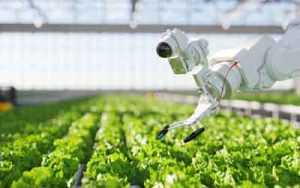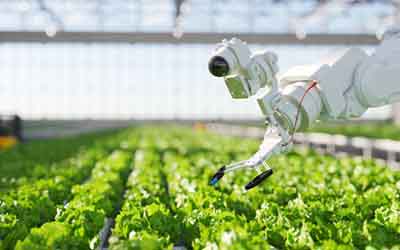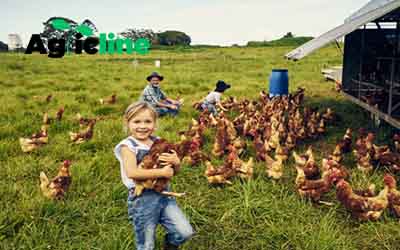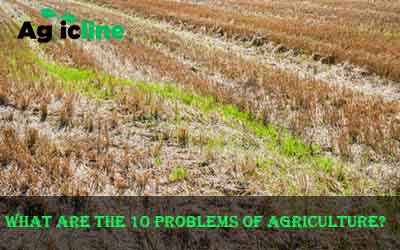As Artificial Intelligence usage increases, farm operators will get access to a growing body of knowledge about developing techniques and use cases, both in the industry and around the world.
Recently, the world has seen tremendous advances in agricultural technology, which have transformed farming techniques.
Climate change, population increase, and resource scarcity all pose threats to the sustainability of our food system, making these advancements increasingly important.
Introducing AI addresses several issues and helps to mitigate many of the downsides of traditional farming.
As you continue to read this article you will not just learn the advantages of AI in agriculture but we will also discuss some of its disadvantages too.
AI in agriculture
Artificial intelligence has emerged as one of the most essential technologies in many industries, including education, banking, robotics, and agriculture.
It plays a critical function in agriculture and is altering the industry.
Also we should note that AI has protected the agriculture sector from a variety of challenges, including climate change, population increase, employment issues in the field, and food safety.
We can’t deny the fact that AI has propelled today’s agricultural system to new heights.
Advantages and Disadvantages of artificial intelligence in agriculture
Artificial intelligence has enhanced agricultural productivity, as well as real-time monitoring, harvesting, processing, and marketing.
Different high-tech computer-based systems are designed to determine a variety of critical factors, including weed detection, yield detection, crop quality, and many more.
With artificial intelligence we can grow and control more crops to feed the nation with ease, which will also help in impacting the economy of a given nation who adopts it.
Advantages of AI in agricultural
Let’s discuss some of the advantages of adopting AI in agriculture.
AI allows for cost savings
Precision farming with AI-enabled technology allows farmers to grow more crops with less resources and costs. AI gives farmers real-time information that allow them to make informed decisions at every level of farming.
With this precise judgment, there will be less product and chemical waste, as well as more efficient time and money management.
Furthermore, it helps farmers to identify specific areas that require irrigation, fertilization, and pesticide treatment, reducing the usage of chemicals on the crop.
All of this adds up to less herbicide use, greater crop quality, and more profits with less resources.
Analyzing market demand
AI can make crop selection easier and help farmers choose which produce will be the most profitable.
Managing risk
AI gives farmers with forecasting and predictive analytics to help them reduce errors and the risk of crop failure.
Automation’s impact
Labor shortages in agriculture are not uncommon. Fortunately, automation provides a solution that eliminates the need to hire more workers.
While mechanization reduced agricultural chores that required superhuman sweat and draft animal labor to jobs that took only a few hours, a new wave of digital technology is once again transforming the industry.
Weather forecasting
AI allows farmers to forecast temperatures and how many fruits and vegetables a harvest will produce.
It can also assist farmers discover the best irrigation patterns depending on projected rainfall.
Investigation and development
Machine learning, including deep learning, may train computers to spot outliers in data or match data to known patterns with unparalleled precision and recall. As a result, innovation occurs faster and more efficiently.
Research data can be identified faster
Applying text analytics and natural language processing to key terms or research minimizes or eliminates the need for manual online and paper sorting.
Improved efficiency and efficacy
AI is being utilized for intelligent automation, such as drones gathering crop photos to estimate farm yields.
Disadvantages to AI adoption in agriculture
Given the benefits of AI for sustainable farming, using this technology may seem like an obvious move for any farmer.
However, everyone is aware of the following major challenges:

Lack of familiarity with AI machines
Despite the numerous benefits of employing AI in agriculture, most people around the world are unfamiliar with the use of AI-enabled solutions and equipment.
To address the concerns, AI businesses should give farmers basic equipment and, after they are comfortable with it, more complex machinery.
Lack of experience with developing technologies
Adoption of AI and new technologies in agriculture by developing countries can be difficult.
It will be extremely difficult to sell such technologies in locations where no agricultural technology is currently in use. Farmers in such places require assistance in using these technologies.
Privacy and security concerns
Because there are now no defined norms and policies governing the use of AI, it may generate a number of legal difficulties.
Furthermore, the usage of software and the internet may result in some privacy and security concerns, such as cyberattacks and data leaks.
All of these factors can provide a significant challenge for farm owners and farmers.
AI start-ups in Agriculture
The following is a list of popular start-ups in agriculture.
Prospera
Prospera is an Israeli startup that was launched in 2014. This organization develops clever solutions for efficient farming.
It creates cloud-based solutions that collect all data from fields, such as soil/water, aerial photos, and so on, and integrate it with an on-site device.
This equipment, known as the Prospera device, extracts insights from this data. The device is driven by a variety of sensors and technologies, including computer vision.
Blue River Technology
Blue-River Technology is a California-based start-up that launched in 2011. It creates next-generation agricultural equipment with AI, computer vision, and robotics technologies.
This technology uses computer vision to identify individual plants, machine learning to decide what action to take, and robotics to carry it out. This helps farmers save money and pesticides while cultivating.
Farmbot
FarmBot is an open-source CNC precision farming machine and software suite that allows anybody to cultivate crops at home.
Farmbot also includes a webapp that can be downloaded to any smartphone or computer system and allows us to manage farming from anywhere, at any time.
OneSoil
Onesoil is an app that helps farmers make better decisions.
Precision farming is achieved through the use of a machine learning algorithm and computer vision.
OneSoil remotely monitors crops, diagnoses field problems, checks weather forecasts, and calculates nitrogen, phosphorus, and potassium fertilizer rates, among other things.
Fasal
AI is increasingly being used in agriculture around the world. Fasal uses low-cost sensors and artificial intelligence to offer farmers real-time data and insights.
Farmers can benefit from real-time, actionable information about day-to-day farm operations.
The company’s products are simple to use in compact spaces. They are creating AI-enabled machines to make precision farming more accessible to farmers everywhere.
Concluding remark on the Advantages and Disadvantages of artificial intelligence in agriculture
The future of AI in agriculture is heavily dependent on the adoption of AI solutions. Although some large-scale research is underway, and certain applications are now on the market, the agricultural industry remains neglected.
Furthermore, developing predictive solutions to address a real-world agricultural situation is still in its early stages.
Recommendation
What education is needed to become a farmer?
How to become a farmer with no experience
How To Become An Agriculturist
Best Agriculture investment opportunities



